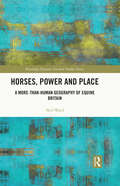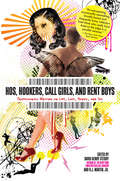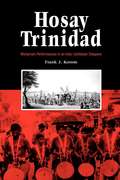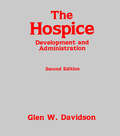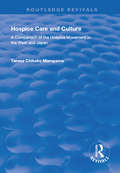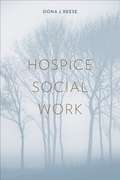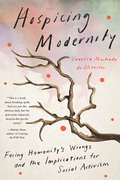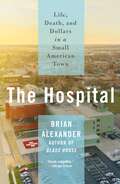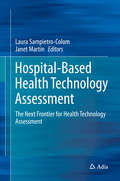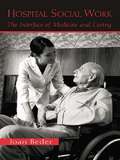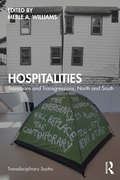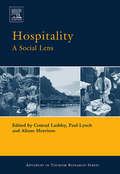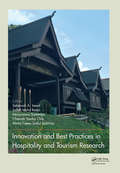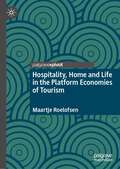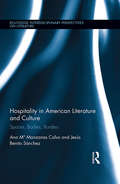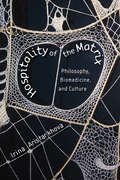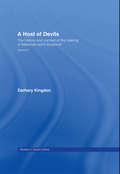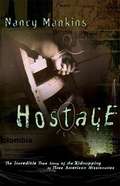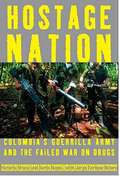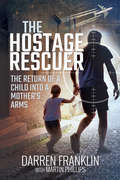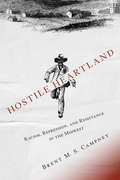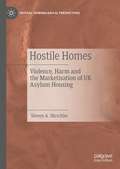- Table View
- List View
Horses, Power and Place: A More-Than-Human Geography of Equine Britain (Routledge Human-Animal Studies Series)
by Neil WardHorses, Power and Place explores the evolution of humanity’s relationship with horses, from early domestication through to the use of the horse as a draught animal, an agricultural, industrial and military asset, and an animal of sport and leisure. Taking an historical approach, and using Britain as a case study, this is the first book-length exploration of the horse in the more-than-human geography of a nation. It traces the role and implications of horse-based mobility for the evolution of settlement structure, urban morphology and the rural landscape. It maps the growth and various uses of horses to the point of ‘peak horse’ in the early twentieth century before considering the contemporary place of the horse in twenty-first century economy and society. It assesses the role of the horse in the formation of places within Britain and in the formation of the nation. The book reflects on the implications of this historical and contemporary equine geography for animal geographies and animal studies. It argues for the study of animals in general in how places are made, not just by humans. Written in a clear and accessible style, this book will be essential reading for students and scholars of animal geography and animal studies more widely.
Hos, Hookers, Call Girls, and Rent Boys: Professionals Writing on Life, Love, Money, and Sex
by R. J. Martin Jr. David Henry SterryThe only thing the writers in this book have in common is that they've exchanged sex for money. They're PhDs and dropouts, soccer moms and jailbirds, $2,500-a-night call girls and $10 crack hos, and everything in between. This anthology lends a voice to an underrepresented population that is simultaneously reviled and worshipped.Hos, Hookers, Call Girls, and Rent Boys is a collection of short memoirs, rants, confessions, nightmares, journalism, and poetry covering life, love, work, family, and yes, sex. The editors gather pieces from the world of industrial sex, including contributions from art-porn priestess Dr. Annie Sprinkle, best-selling memoirist David Henry Sterry (Chicken: Self-Portrait of a Young Man for Rent), sex activist and musical diva Candye Kane, women and men right off the streets, girls participating in the first-ever National Summit of Commercially Sexually Exploited Youth, and Ruth Morgan Thomas, one of the organizers of the European Sex Work, Human Rights, and Migration Conference.Sex is a billion-dollar industry. Meet the real people who are its flesh and blood.
Hosay Trinidad: Muharram Performances in an Indo-Caribbean Diaspora
by Frank J. KoromThe multivocalic rite known as Hosay in the Caribbean developed out of earlier practices originating in Iraq and Iran which diffused to Trinidad by way of South Asian indentured laborers brought to the Caribbean by the British from the mid-1800s to the early decades of the twentieth century. The rituals are important as a Shi'i religious observance, but they also are emblems of ethnic and national identity for Indo-Trinidadians. Frank Korom investigates the essential role of Hosay in the performance of multiple identities by historically and ethnographically situating the event in Middle Eastern, South Asian, and Caribbean contexts. Hosay Trinidad: Muharram Performances in an Indo-Caribbean Diaspora is the first detailed historical and ethnographic study of Islamic muharram rituals performed on the island of Trinidad.Korom's central argument is that the annual rite is a polyphonic discourse that is best understood by employing multiple levels of interpretation. On the symbolic level the observance provides esoteric meaning to a small community of Indo-Trinidadian Muslims. On another level, it is perceived to be representative of "transplanted" Indian culture as a whole. Finally, the rituals are becoming emblematic of Trinidad's polyethnic population. Addressing strategies used to resist integration and assimilation, Hosay Trinidad is engaged with theories concerning the notion of cultural creolization in the Caribbean as well as in the general study of global diasporas.
The Hospice: Development and Administration (Death Education, Aging and Health Care)
by Glen W. DavidsonFirst published in 1985. Routledge is an imprint of Taylor & Francis, an informa company.
Hospice Care and Culture: A Comparison of the Hospice Movement in the West and Japan (Routledge Revivals)
by Teresa Chikako MaruyamaFirst published in 1999, Maruyama explores some significant difficulties and differences in bringing the western hospice philosophy to the Japanese medical culture. Whilst not giving any definite answers, this study determines what some of the critical questions that need to be considered into Japanese medicine, as Mayuyama argues without defining these questions to begin with we cannot find appropriate solutions.
Hospice Social Work (End-of-Life Care: A Series)
by Dona ReeseThe first text to explore the history, characteristics, and challenges of hospice social work, this volume weaves leading research into an underlying framework for practice and care. A longtime practitioner, Dona J. Reese describes the hospice social work role in assessment and intervention with individuals, families, groups, organizations, and the community, while honestly confronting the personal and professional difficulties of such life-changing work. She introduces a well-tested model of psychosocial and spiritual variables that predict hospice client outcomes, and she advances a social work assessment tool to document their occurrence. Operating at the center of national leaders' coordinated efforts to develop and advance professional organizations and guidelines for end-of-life care, Reese reaches out with support and practice information, helping social workers understand their significance in treating the whole person, contributing to the cultural competence of hospice settings, and claiming a definitive place within the hospice team.
Hospice Social Work
by Dona J ReeseThis is the first book to explore the history, characteristics, and challenges of hospice social work, incorporating leading research into an underlying framework for practice and care. A longtime hospice social work practitioner, Dona J. Reese describes the hospice social work role in assessment and intervention with individuals, families, groups, organizations, and the community, while honestly confronting the personal and professional difficulties of such life-changing work. She introduces a well-tested model of psychosocial and spiritual variables that predict hospice client outcomes, and she advances a social work assessment tool that documents their occurrence. Operating at the center of national leaders' coordinated efforts to develop and advance professional organizations and guidelines for end-of-life care, Reese reaches out with support and practice information, helping social workers understand their significance in treating the whole person, contributing to the cultural competence of hospice settings, and claiming a definitive place within the hospice team.
Hospicing Modernity: Facing Humanity's Wrongs and the Implications for Social Activism
by Vanessa Machado de OliveiraFor fans of Everything Is F*cked and Against Purity: Living Ethically in Compromised Times, a book about facing the multiple crises of modernity--and hospicing modernity--with maturity, humility, and integrity.This book is not easy: it contains no quick-fix plan for a better, brighter tomorrow, and gives no ready-made answers. Instead, Vanessa Machado de Oliveira presents us with a challenge: to grow up, step up, and show up for ourselves, our communities, and the living Earth, and to interrupt the modern behavior patterns that are killing the planet we&’re part of. Driven by expansion, colonialism, and resource extraction and propelled by neoliberalism and rabid consumption, our world is profoundly out of balance. We take more than we give; we inoculate ourselves in positive self-regard while continuing to make harmful choices; we wreak irreparable havoc on the ecosystems, habitats, and beings with whom we share our planet. But instead of drowning in hopelessness, how can we learn to face our reality with humility and accountability? Machado de Oliveira breaks down archetypes of cognitive dissonance--the do-gooder who does "good enough," then retreats to business as usual; the incognito capitalist who, at first glance, may seem like a radical change-maker--and asks us to dig deeper and exist differently. She explains how our habits, behaviors, and belief systems hold us back...and why it's time now to gradually disinvest. Including exercises used with teachers, NGO practitioners, and global changemakers, she offers us thought experiments that ask us to: • Reimagine how we learn, unlearn, and respond to crisis• Better assess our surroundings and interact with difference, uncertainty, complexity, and failure• Expand our capacity to hold personal and collective space for difficult and painful things• Understand the "5 modern-colonial e's": Entitlements, Exceptionalism, Exaltation, Emancipation, and Enmeshment in low-intensity struggle activism• Interrupt our satisfaction with modern-colonial desires that cause harm• Create space for change driven neither by desperate hope nor a fear of desolate hopelessness For fans of adrienne maree brown, Sherri Mitchell, and Arundhati Roy, Hospicing Modernity challenges our assumptions and dares to ask more of us, for the sake of us all.
The Hospital: Life, Death, and Dollars in a Small American Town
by Brian AlexanderUSA Today's 5 BOOKS NOT TO MISS | The Washington Post's 10 BOOKS TO READ IN MARCH | Fortune's 11 BOOKS TO READ IN MARCH"Takes readers into the world of the American medical industry in a way no book has done before....details how we’ve created the dilemma we’re in." —Fortune"With his signature gut-punching prose, Alexander breaks our hearts as he opens our eyes to America’s deep-rooted sickness and despair by immersing us in the lives of a small town hospital and the people it serves." —Beth Macy, bestselling author of Dopesick An intimate, heart wrenching portrait of one small hospital that reveals the magnitude of America’s health care crises.By following the struggle for survival of one small-town hospital, and the patients who walk, or are carried, through its doors, The Hospital takes readers into the world of the American medical industry in a way no book has done before. Americans are dying sooner, and living in poorer health. Alexander argues that no plan will solve America’s health crisis until the deeper causes of that crisis are addressed. Bryan, Ohio's hospital, is losing money, making it vulnerable to big health systems seeking domination and Phil Ennen, CEO, has been fighting to preserve its independence. Meanwhile, Bryan, a town of 8,500 people in Ohio’s northwest corner, is still trying to recover from the Great Recession. As local leaders struggle to address the town’s problems, and the hospital fights for its life amid a rapidly consolidating medical and hospital industry, a 39-year-old diabetic literally fights for his limbs, and a 55-year-old contractor lies dying in the emergency room. With these and other stories, Alexander strips away the wonkiness of policy to reveal Americans’ struggle for health against a powerful system that’s stacked against them, but yet so fragile it blows apart when the pandemic hits. Culminating with COVID-19, this book offers a blueprint for how we created the crisis we're in.
Hospital-Based Health Technology Assessment
by Laura Sampietro-Colom Janet MartinA timely work describing how localized hospital-based health technology assessment (HB-HTA) complements general, 'arms-length' HTA agency efforts, and what has been the collective global impact of HB-HTA across the globe. While HB-HTA has gained significant momentum over the past few years, expertise in the field, and information on the operation and organization of HB-HTA, has been scattered. This book serves to bring this information together to inform those who are currently working in the field of HTA at the hospital, regional, national or global level. In addition, this book is intended for decision-makers and policy-makers with a stake in determining the uptake and decommissioning of new and established technologies in the hospital setting. HTA has traditionally been performed at the National/Regional level by HTA Agencies, typically linked to governments. Yet hospitals are the main entry door for most health technologies (HTs). Hospital decision-makers must undertake multiple high stakes investment and disinvestment decisions annually for innovative HTs, usually without adequate information. Despite the existence of arms-length HTA Agencies, inadequate information is available to hospital decision-makers either because relevant HTA reports are not yet released at the time of entry of new technologies to the field, or because even when the report exists, the information contained is insufficient to clarify the contextualized informational needs of hospital decision makers. Therefore, there has recently been a rising trend toward hospital-based HTA units and programs. These units/programs complement the work of National/Regional HTA Agencies by providing the key and relevant evidence needed by hospital decision makers in their specific hospital context, and within required decision-making timelines. The emergence of HB-HTA is creating a comprehensive HTA ecosystem across health care levels, which creates better bridges for knowledge translation through relevance and timeliness.
Hospital Social Work: The Interface of Medicine and Caring
by Joan BederHospital Social Work introduces the reader to the world of medicine and social work as seen through the eyes of actual social workers. An essential reference for both students and professionals. Over 100 social workers in dozens of hospitals were interviewed to provide the reader with first-hand experiences and discussions of practice principles, policy considerations, and theoretical treatments to provide each chapter with a unique blend of theory and practice. Joan Beder, a professor of social work and a practicing social worker, recently noted an apparent lack of empirical discussion of the actual role and day-to-day functioning of the medical social worker. Hospital Social Work is the result, a unique supplemental text for both studying and practicing medical social workers.
Hospitalities: Transitions and Transgressions, North and South
by Merle A. WilliamsThis collection of imaginative essays traces notions of hospitality across a sequence of theoretical permutations, not only as an urgent challenge for our conflicted present, but also as foundational for ethics and resonant within the play of language. The plural form of the title highlights the inter-implication of hospitality with its exclusive others, holding suspicious rejection in tension with the receptiveness that transforms socio-cultural relations. Geographically, the collection traverses the globe from Australia and Africa to Britain, Europe and the United States, weaving exchanges from south to north, as well as south to south, and thoughtfully remapping our world. Temporally, the chapters range from the primordial hospitality offered by the earth, through the Middle Ages, to contemporary detention centres and the crisis of homelessness. Thematically, hospitality embraces sites of dwelling and the land, humans and animals in their complex embodiment, spectres and the dead, dolls and art objects.This text openly welcomes the reader to participate in shaping fresh critical discourses of the hospitable, whether in literary and linguistic studies, art and architecture, philosophy or politics.
Hospitality: A Social Lens (Routledge Advances In Tourism Ser.)
by Paul Lynch Conrad Lashley Alison MorrisonHospitality: a social lens follows on from the unique contribution made by In Search of Hospitality: theoretical perspectives and debates. It progresses debate, challenges the boundaries of ways of knowing hospitality, and offers intellectual insights stimulated by the study of hospitality. The contributing authors provide tangible evidence of continuing advancement and development of knowledge pertaining to the phenomenon of hospitality. They draw on the richness of the social sciences, taking host and guest relations as a means of studying in-group and out-group relations with and between societies. The chapter contributors represent a multi-disciplinary, international grouping of leading academics with expertise in hospitality management and education, human resource management, linguistics, modern languages, gastronomy, history, human geography, art, architecture, anthropology, and sociology. Each lends their expertise to apply as a social lens through which to view, analyse, and explore hospitality within a range of contexts. Through this process novel ways of interpreting, knowing and sense-making emerge that are captured in the final chapter of the book, and have informed future research themes which are explored.
Hospitality and Tourism 2015: Proceedings of HTC 2015 (Malacca, Malaysia, 2-3 November 2015)
by Salamiah A. Jamal Salleh Mohd Radzi Norzuwana Sumarjan Chemah Tamby Chik Mohd Faeez Saiful BakhtiarInnovation and Best Practices in Hospitality and Tourism Research contains 71 accepted papers from the Hospitality and Tourism Conference (HTC 2015, Melaka, Malaysia, 2-3 November, 2015). The book presents theup-and-coming paradigms and innovative practices within the hospitality and tourism industries, and covers the following topics:Mana
Hospitality, Home and Life in the Platform Economies of Tourism
by Maartje RoelofsenThis book explores how digital platforms in the realm of tourism and hospitality have shaped social and material worlds. Based on extensive ethnographic fieldwork with hosts and guests, the book analyses the impacts of platforms on the scale of the city, the home, and the everyday life of individuals. The book first situates platforms within the broader history of digital developments in tourism and questions what is essentially new about these socio-technical formations? The following chapters demonstrate how platforms have affected urban housing, challenged the tourism sector, and transformed understandings of hospitality and home. This is illustrated through a case-study of Airbnb’s development and impact in Sofia, Bulgaria. The final chapters of the book reflect on the political dimensions of datafication processes and digital systems of measurement that underpin the platform’s workings, showing how the platform economies of tourism benefit their users in highly uneven ways.
Hospitality in American Literature and Culture: Spaces, Bodies, Borders (Routledge Transnational Perspectives on American Literature)
by Ana Maria Manzanas Calvo Jesús Benito SanchezThis volume examines hospitality in American immigrant literature and culture, situating this ancient virtue at the crossroads of space and border theory, and exploring the relationship among the intersecting themes of migration, citizenship, identity formation, and spatiality. Assessing the conditions, duration, and shifting roles of hosts and guests in the United States, the book concentrates on the ways the US administers protocols of belonging and non-belonging, and distinguishes between those who can feel at home from those who will always be outside the body politic, even if they were the original "hosts." The volume opens with a genealogy of hospitality through a focus on its sites, from its origins in the Bible, to its national and post-national renditions in contemporary American literature and culture. The authors explore recent representations of immigrant spatiality, from the space of the body in Spielberg’s The Terminal and Frears’s Dirty Pretty Things, to the different ways in which immigrants are incorporated into the United States in Alex Rivera’s Sleep Dealer, Karen T. Yamashita’s I Hotel, Junot Díaz’s "Invierno," and Ernesto Quiñonez’s Chango’s Fire, concluding with the spectrality of the immigrant body in George Saunders’ "The Semplica Girl Diaries." Timely and imperative in light of the legacies of colonialism, and the realities of modern-day globalization, this book will be of value to specialists in post-colonialism; American Studies; immigration, diaspora, and border studies; and critical race and gender studies for its innovative approaches to media and literary texts.
Hospitality of the Matrix: Philosophy, Biomedicine, and Culture
by Irina AristarkhovaThe question "Where do we come from?" has fascinated philosophers, scientists, and artists for generations. This book reorients the question of the matrix as a place where everything comes from (chora, womb, incubator) by recasting it in terms of acts of "matrixial/maternal hospitality" producing space and matter of and for the other. Irina Aristarkhova theorizes such hospitality with the potential to go beyond tolerance in understanding self/other relations. Building on and critically evaluating a wide range of historical and contemporary scholarship, she applies this theoretical framework to the science, technology, and art of ectogenesis (artificial womb, neonatal incubators, and other types of generation outside of the maternal body) and proves the question "Can the machine nurse?" is critical when approaching and understanding the functional capacities and failures of incubating technologies, such as artificial placenta. Aristarkhova concludes with the science and art of male pregnancy, positioning the condition as a question of the hospitable man and newly defined fatherhood and its challenge to the conception of masculinity as unable to welcome the other.
A Host of Devils: The History and Context of the Making of Makonde Spirit Sculpture (Studies in Visual Culture)
by Zachary KingdonA Host of Devils provides an in-depth account of the background, origin and development of the spirit figure sculptures which emerged during colonial times among the Makonde people of Mozambique.The creation of such works is shown to connect with a regional system of knowledge and practice, within which spirits function as a format for expression. The book describes the ways in which the sculpture emerged, as well as the author's experience of learning how to carve.
Hostage: The Incredible True Story of the Kidnapping of Three American Missionaries
by Nancy MankinsAs missionaries to the Kuna Indians in Pticuro, Panama, Dave and Nancy Mankins were living their dream. After seven years of learning the culture and ministering among the Kuna, the Mankinses had found a home in this small village. then in one terrifying moment their dream was shattered. On January 31, 1993, Colombian rebels burst into their home and captured Dave, along with fellow missionaries Mark Rich and Rick Tenenoff. Helplessly, their wives watched in horror as the three men were seized at gunpoint and taken into the Colombian jungles. In this riveting story, Nancy Mankins collaborates with the other two wives to create a complete account of the events surrounding their husbands’ abduction. From their first day as missionaries in Pucuro to the agonizing years of working tirelessly to gain their husbands’ release, Hostage is the inspiring account of the women’s courage and faith that continues to sustain them through impossible circumstances.
Hostage: 15 Days in Hell
by Keith Rapp Robert Con DavisIn January 2004, America's national attention was riveted by the longest prison standoff in history and the brutal hostage-taking of Corrections Officer Lois Fraley. A pair of violent convicts at the Arizona State Prison-Lewis Complex breached a prison watchtower after a failed breakout attempt, taking Fraley and another Correctional Officer captive in a siege that would last for fifteen days. For over two weeks, the inmates would lead negotiators, tactical police, paramilitary planners, prison officials, the governor's office and news media through a maze of madness.
Hostage Nation: Colombia’s Guerrilla Army and the Failed War on Drugs
by Victoria Bruce Karin Hayes Jorge Enrique BoteroThis blistering journalistic expos offers an account of government negligence, corporate malfeasance, familial struggle, drugs, politics, murder, and a daring rescue operation in the Colombian jungle.
The Hostage Rescuer: The Return of a Child into a Mother's Arms
by Darren Franklin Martin PhillipsThe gripping true crime story of a child abducted by his father from his mother, and the international race to rescue him against dangerous odds.Two close encounters with death convince Darren Franklin that his career in global private security is not the healthiest. Meanwhile Scottish nurse Diane is on a life-changing journey of her own after a Shirley Valentine-style romance on a Greek holiday island. As she moves to Australia to marry her Greek lover and start a family, Darren escapes a contract on his life and teams up with a former British special forces operative to get into the business of rescuing abducted children. Then Darren’s and Diane’s paths cross. After Diane’s marriage breaks down, her ex takes their four-year-old son Theo back to the Greek islands, and, when all attempts to get her son back via the courts have failed, Darren’s company is called in to get him back. As Diane waits anxiously in the wings, Darren and his small team must contend with hostile locals, double-crossing police, and dubious legal contacts to conduct surveillance on their target, formulate a plan, and grab the boy before making their hazardous escape. They can trust no one. A whole island community is against them, they have their suspicions about their own lawyer, and the charity go-between on their team is actively leaking details of their plans, risking their mission, and possibly their lives. Set against an epidemic of parental abductions, and a background of frequent failed recoveries, the action swings from Britain to South America to Australia, to the USA and the Greek Islands on a dramatic, emotional roller coaster from start to finish.
The Hostage Rescuer: The Return of a Child into a Mother's Arms
by Darren Franklin Martin PhillipsThe gripping true crime story of a child abducted by his father from his mother, and the international race to rescue him against dangerous odds.Two close encounters with death convince Darren Franklin that his career in global private security is not the healthiest. Meanwhile Scottish nurse Diane is on a life-changing journey of her own after a Shirley Valentine-style romance on a Greek holiday island. As she moves to Australia to marry her Greek lover and start a family, Darren escapes a contract on his life and teams up with a former British special forces operative to get into the business of rescuing abducted children. Then Darren’s and Diane’s paths cross. After Diane’s marriage breaks down, her ex takes their four-year-old son Theo back to the Greek islands, and, when all attempts to get her son back via the courts have failed, Darren’s company is called in to get him back. As Diane waits anxiously in the wings, Darren and his small team must contend with hostile locals, double-crossing police, and dubious legal contacts to conduct surveillance on their target, formulate a plan, and grab the boy before making their hazardous escape. They can trust no one. A whole island community is against them, they have their suspicions about their own lawyer, and the charity go-between on their team is actively leaking details of their plans, risking their mission, and possibly their lives. Set against an epidemic of parental abductions, and a background of frequent failed recoveries, the action swings from Britain to South America to Australia, to the USA and the Greek Islands on a dramatic, emotional roller coaster from start to finish.
Hostile Heartland: Racism, Repression, and Resistance in the Midwest
by Brent CampneyWe forget that racist violence permeated the lower Midwest from the pre-Civil War period until the 1930s. From Kansas to Ohio, whites orchestrated extraordinary events like lynchings and riots while engaged in a spectrum of brutal acts made all the more horrific by being routine. Also forgotten is the fact African Americans forcefully responded to these assertions of white supremacy through armed resistance, the creation of press outlets and civil rights organizations, and courageous individual activism. Drawing on cutting-edge methodology and a wealth of documentary evidence, Brent M. S. Campney analyzes the institutionalized white efforts to assert and maintain dominance over African Americans. Though rooted in the past, white violence evolved into a fundamentally modern phenomenon, driven by technologies such as newspapers, photographs, automobiles, and telephones. Other surprising insights challenge our assumptions about sundown towns, who was targeted by whites, law enforcement's role in facilitating and perpetrating violence, and the details of African American resistance.
Hostile Homes: Violence, Harm and the Marketisation of UK Asylum Housing (Critical Criminological Perspectives)
by Steven A. HirschlerThis book explores the ways in which the state and private security firms contribute to the direct and structural harm of asylum seekers through policies and practices that result in states of perpetual destitution, exclusion, and neglect. By synthesising historic and contemporary public policy, criminological and sociological perspectives, political philosophy, and the direct experiential accounts of asylum seekers living within dispersed accommodation, this text exposes the complex and co-dependent relationship between the state’s social control aims and neoliberal imperatives of market expansion into the immigration control regime. The title borrows from former Home Secretary Theresa May’s pronouncement that the UK government aimed to foster a ‘hostile environment’ in its response to illegal immigration. While the Home Office later attempted to rebrand its hostile environment policy as a ‘compliant environment’, this book illustrates how aggressive approaches toward the management of asylum-seeking populations has effectively extended the hostile environment to those legally present within the UK. Through an examination of the expanded privatisation of dispersed asylum housing and the UK government’s reliance on contracts with private security firms like G4S and Serco, this book explores the lived realities of hostile environments as asylum seekers’ accounts reveal the human costs of marketised asylum accommodation programmes.
